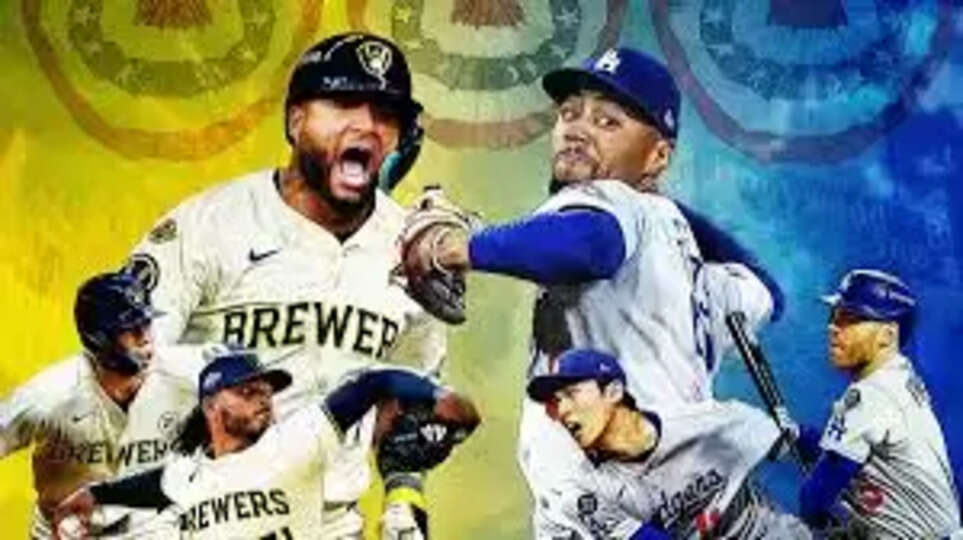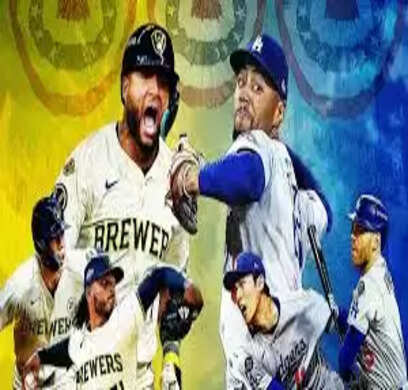Dodgers vs. Brewers NLCS: Will Los Angeles Take a Commanding 2-0 Lead or Can Milwaukee's Grit Even the Series?
Dive deep into the Dodgers vs. Brewers NLCS Game 2 matchup. After a thrilling 2-1 Game 1 win by the Dodgers, discover the key pitching matchup, offensive showdowns, and bold predictions for this pivotal postseason contest.


Introduction
The intensity of the Major League Baseball playoffs has peaked with a captivating National League Championship Series (NLCS) battle between the reigning World Series champion Los Angeles Dodgers and the National League's regular-season wins leader, the Milwaukee Brewers. The Dodgers drew first blood in this best-of-seven series, narrowly defeating the Brewers 2-1 in a nail-biting Game 1 on Monday night. The opener was a classic pitcher's duel, highlighted by a historically dominant performance from Dodgers ace Blake Snell, a clutch Freddie Freeman home run, and a wild, game-ending moment that left fans on the edge of their seats.
Now, all eyes turn to Game 2 at American Family Field in Milwaukee. This is a pivotal moment: the Dodgers aim to put an imposing 2-0 chokehold on the series before it shifts to Los Angeles, while the resilient Brewers must defend their home turf to avoid a deep hole against a powerhouse opponent. The stage is set for a dramatic Tuesday night as two of the game’s premier young pitchers take the mound, promising another low-scoring, high-stakes affair that will heavily influence the path to the World Series.
Yoshinobu Yamamoto vs. Freddy Peralta: A Duel of Aces in Game 2
The matchup of starting pitchers for Game 2 is nothing short of compelling, pitting two hard-throwing right-handers against each other: Dodgers rookie sensation Yoshinobu Yamamoto and Brewers ace Freddy Peralta. The pitching staff, more than any other unit, will determine the fate of the series in Milwaukee.
Yamamoto's Opportunity for Playoff Redemption
Yoshinobu Yamamoto, one of the most heralded international free agents in recent memory, will toe the rubber for the Dodgers. His first postseason has been a mixed bag, showcasing flashes of brilliance alongside a couple of shorter, more challenging outings. For a pitcher with a 2.49 ERA during the regular season, Yamamoto is under pressure to deliver a dominant performance. The Brewers, notably, gave him trouble during the regular season, including one tough outing where they knocked him out early. However, the Dodgers’ strategy is clear: keep him on regular rest and rely on his elite command and deep pitch mix to tame a Brewers lineup that, while gritty and fundamentally sound, doesn't rely on star power as much as Los Angeles. A strong outing from Yamamoto would provide a much-needed mental break for a Dodgers bullpen that was taxed in Game 1.
Freddy Peralta: Milwaukee's Last Line of Home Defense
For the Brewers, Freddy Peralta is their undisputed ace and their best chance to neutralize the Dodgers’ potent offense. Peralta finished the regular season with a stellar record and a 2.70 ERA, leading the National League in wins. He is an electric pitcher who relies heavily on a high-velocity four-seam fastball, complemented by a sharp changeup and curveball. The Brewers will need the vintage, high-strikeout version of Peralta to shut down the $200 million Los Angeles lineup. His ability to minimize hard contact and pitch deep into the game is paramount, especially after Milwaukee’s bullpen was forced to cover significant innings in the NLDS and the late stages of Game 1.
The Shadow of Game 1: Momentum and Bullpen Concerns
Game 1 was a masterclass in playoff baseball strategy, defensive wizardry, and late-game drama. The lingering effects of the Dodgers' 2-1 victory will be palpable in Game 2, shaping both managers' decisions.
Blake Snell's Dominant Legacy and Bullpen Anxiety
Dodgers starter Blake Snell delivered arguably the most dominant performance of his postseason career, going eight scoreless innings while striking out ten and allowing just one hit and zero walks. However, the one-run lead he handed over quickly became a terrifying situation in the ninth inning. Rookie closer Roki Sasaki struggled, and the Brewers loaded the bases against veteran Blake Treinen before a strikeout ended the threat. This shaky ninth inning has reignited concerns about the Dodgers' bullpen depth and reliability in high-leverage situations. Manager Dave Roberts will be eager for Yamamoto to pitch six-plus solid innings to allow the bullpen to reset.
The Brewers' "Miracle" Double Play
Lost in the final score was one of the most spectacular, heads-up defensive plays in recent playoff history. In the fourth inning, with the bases loaded, a deep drive by Max Muncy was ruled a live ball after initially popping out of the center fielder’s glove. Amid the confusion, the Brewers’ defense, led by catcher William Contreras, executed a phenomenal 8-6-2 double play, turning a potential grand slam into a rally-killing end to the inning. This fundamentally sound, high-IQ defensive play embodies the "Grit and Fundamentals" identity of the Brewers. While they lost the game, the play demonstrated their mental toughness and refusal to be intimidated by the star power across the field.
Los Angeles Dodgers: Star Power and the Ohtani Question Mark
The Dodgers are the favored team for a reason: their roster is a collection of the game's best players. Yet, there is a clear divide between the offensive output of their top stars.
The Clutch Production of Freeman and Betts
While Shohei Ohtani has struggled at the plate in the postseason, going 1-for-18 in the NLDS and seeing numerous intentional walks in Game 1, the other two-thirds of the Dodgers' lethal trio—Freddie Freeman and Mookie Betts—have continued to deliver. Freeman’s solo home run broke the scoreless tie in Game 1, and Betts drew a bases-loaded walk to plate the winning run. Their consistent, high-leverage production forces opponents to make difficult, sometimes regrettable, pitching decisions, which is the hallmark of a champion-caliber offense.
Shohei Ohtani's Offensive Slump
Shohei Ohtani's offensive struggles have been one of the biggest talking points of the 2025 playoffs. Despite his hitting slump, opponents are still walking him to get to Mookie Betts. This strategy paid off for the Dodgers in Game 1. However, if Ohtani can break out of his slump—even for a single game—the Dodgers' lineup becomes nearly unstoppable. Manager Dave Roberts has strategically lined up Ohtani to pitch later in the series, allowing him to focus solely on his hitting early on. The Brewers must walk a fine line between respecting his legendary power and challenging him to maximize their chances of winning.
Milwaukee Brewers: The Underdogs' Blueprint for Victory
Despite having the best regular-season record in the National League, the small-market Brewers enter the series as clear underdogs. Their path to victory is not through a slugfest but through small ball, speed, and pitching depth.
Leaning on Speed and Base-Running Aggression
The Brewers finished the regular season as one of the most aggressive and successful base-running teams in baseball. Players like Brice Turang and Jackson Chourio can disrupt a pitcher’s rhythm and manufacture runs, which is essential against an offense like the Dodgers. The one hit they managed against Snell in Game 1 was immediately nullified by a pickoff, a mistake the Brewers cannot afford to repeat. In a series dominated by pitching, a stolen base or an extra base taken can be the difference between a win and a loss.
The Brewers' Home-Field Advantage
The electric atmosphere at American Family Field is a significant factor. The Brewers play exceptionally well at home and will lean on their passionate fanbase to create a hostile environment for the Dodgers. The pressure is on Milwaukee to even the series, and the players—from veteran Christian Yelich to young standouts like William Contreras—will feed off the energy to push past the star-studded roster of their rivals.
FAQ's
Q1: What was the final score of Dodgers vs. Brewers NLCS Game 1?
A: The Los Angeles Dodgers defeated the Milwaukee Brewers in Game 1 of the NLCS with a final score of 2-1.
Q2: Who are the starting pitchers for NLCS Game 2?
A: The starting pitchers for Game 2 are Yoshinobu Yamamoto (RHP) for the Los Angeles Dodgers and Freddy Peralta (RHP) for the Milwaukee Brewers.
Q3: Did Shohei Ohtani hit a home run in Game 1?
A: No, Shohei Ohtani did not hit a home run in Game 1. The Dodgers' runs were scored on a solo home run by Freddie Freeman and a bases-loaded walk drawn by Mookie Betts in the ninth inning.
Q4: Why was there a major controversy in Game 1?
A: The main controversial play was a spectacular, inning-ending 8-6-2 double play turned by the Brewers in the fourth inning on a deep fly ball hit by Max Muncy. The ball hit the top of the wall and was ruled a live ball, but confused Dodgers base runners were forced out at home plate and third base.
Q5: Who won the regular-season series between the Dodgers and Brewers?
A: The Milwaukee Brewers won the regular-season series, taking all six games against the Los Angeles Dodgers.
Conclusion
Game 2 of the NLCS is more than just another game; it's a monumental swing-game in the series. The Los Angeles Dodgers, buoyed by their Game 1 victory and the sheer talent of their roster, are seeking to establish an insurmountable lead. The Milwaukee Brewers, a team defined by their resilience, pitching, and fundamental defense, are fighting to protect their home advantage and reset the series before traveling to the West Coast. With Yoshinobu Yamamoto looking for a big playoff moment and Freddy Peralta determined to be the stopper, expect another tight, tense, and expertly managed game. For the Brewers, this is a must-win to affirm their regular-season dominance and show the baseball world that grit can indeed conquer Goliath. The outcome of this contest will send a powerful message about which team has the mental and physical fortitude to advance to the World Series.
